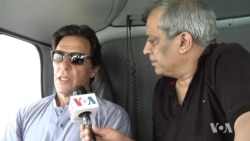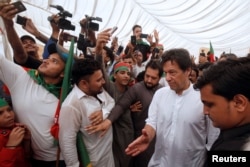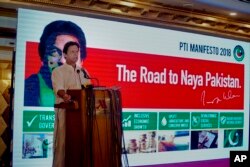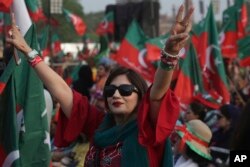Imran Khan, a leading candidate to become Pakistan’s next prime minister, says he is hopeful about his party's chances of winning the July 25 national election.
“I am an optimist, a sportsman who always used to think he would win. This is the best I have ever been prepared, my party has ever been prepared, to contest elections in the last 22 years. So, we feel we have a very good chance,” Khan told VOA, while campaigning in the scenic northwestern town of Shangla.
Khan, 65, is campaigning on promises to crack down on government corruption, enact anti-poverty programs, improve health and education and turn his country into an Islamic welfare state.
The sports celebrity-turned politician’s Pakistan Tehreek-e-Insaf (PTI) party, which means the movement for justice, is slightly ahead or just trailing its main rival, the Pakistan Muslim League-Nawaz (PML-N) party of deposed prime minister Nawaz Sharif, according to the latest opinion polls. Khan’s party is well ahead of the Pakistan Peoples Party (PPP), once a formidable national political force.
The Oxford-educated Khan launched PTI in 1996, soon after leading his national cricket team to winning the 1992 cricket world cup. But he struggled from the outset in terms of organizing his party into an effective political challenge to the PML-N and PPP, the two main parties that have been repeatedly in power when the military was not ruling the country.
Khan’s political fortunes have risen since last year when the Supreme Court removed Sharif from office for undeclared assets and barred him from holding a public office for the rest of his life.
An anti-corruption court subsequently sentenced the deposed prime minister and his daughter, heir-apparent Maryam, to long jail terms for possessing overseas properties that were worth much more than their known sources of income.
Sharif's disqualification stemmed from the 2016 so-called Panama Papers leaks that named his daughter and two sons, among international personalities, owning offshore holding companies in the British Virgin Islands. The Sharif family used the companies to buy properties in upscale London.
Accusations of collusion
But Sharif’s party and other related groups accuse Khan of colluding with the army in pushing “politically motivated” corruption cases against election rivals. Khan denies that and blames Sharif for unleashing a propaganda campaign against him.
“So, once his name came in the Panama Leaks [Panama Papers] and eventually he’s got convicted of corruption of billions of rupees money-laundered out of Pakistan and he is blaming that on the army as if has there been some conspiracy against him,” Khan insisted.
“And because I took him to court and because I won the case against him then he thinks that I am part of the conspiracy, which is bizarre,” he said.
For its part, the military also vehemently denies it is interfering in the democratic process, saying the institution in coordination with civilian organizers is working to assist in holding “free and fair” polls in a secure environment.
But Independent monitors have raised concerns over the alleged “political engineering” by the army. I.A. Rehman, a senior member of independent Human Rights Commission of Pakistan (HRCP), has questioned the integrity of what he acknowledges is the “most intensely” contested polls.
“It is also the dirtiest election in our history. We have very grave and serious doubts whether the election is going to be free and fair,” Rehman noted.
In a scathing statement released this week, HRCP lamented what it saw as “blatant, aggressive and unabashed attempts to manipulate the outcome of the elections.” The watchdog stopped short of naming Khan’s party.
Despite the allegations, Khan’s anti-corruption campaign appears to be resonating widely - especially among younger Pakistanis clamoring for change.
Pakistan-US ties
Whoever comes to power will have to work hard to reverse the deterioration in Pakistan’s relations with the United States. Washington accuses Islamabad of not doing enough to help convince the Taliban to seek a negotiated end to the war in Afghanistan.
Khan, a conservative on national security, says his country has made unprecedented sacrifices in the U.S.-led war against terrorism. But he expressed skepticism he would be able to persuade U.S. President Donald Trump if he becomes the prime minister.
“He [Trump] is unpredictable. I can’t say what he will do,” the Pakistani politician told VOA.
“The relationship is not good but, you know, America is a superpower, we need to have a good relationship with it. We need to be treated a bit different to just being a hired gun,” Khan said.
Pakistan joined the U.S.-led “war on terrorism” after the September 11th 2001 attacks on the U.S. to help secure neighboring Afghanistan, receiving billions of dollars in U.S. assistance in return.
But Washington has consistently accused Islamabad of covertly helping the very militants it was supposed to take action against.
Pakistani leaders have consistently rejected the charge. They cite tens of thousands of fatalities, including both civilian and security forces, the country has suffered in terrorist attacks and billions of dollars in losses to the national economy.
“There is a mistrust between the two countries. And so the need of the hour is to build proper relationship with Afghanistan, building up confidence and somehow Pakistan helping Afghanistan in some sort of a political solution,” Khan said when asked for his thoughts on what is needed to be done to improve Islamabad's ties with Kabul.
He welcomed Afghan President Ashraf Ghani’s offer of unconditional peace talks with the Taliban insurgency and the U.S. backing the initiative. "Whatever influence Pakistan can use, I think it should help bring an end to the war in Afghanistan."
Taliban leaders are allegedly using sanctuary in Pakistan, charges, military officials reject. They maintain the insurgents have moved back to Afghanistan where the Taliban controls or influences nearly half of the country.








